Dacthal Herbicide Lawsuit
- Last Updated: June 12th, 2025

Attorney Jessica Paluch-Hoerman, founder of TruLaw, has over 28 years of experience as a personal injury and mass tort attorney, and previously worked as an international tax attorney at Deloitte. Jessie collaborates with attorneys nationwide — enabling her to share reliable, up-to-date legal information with our readers.
Legally Reviewed
This article has been written and reviewed for legal accuracy and clarity by the team of writers and legal experts at TruLaw and is as accurate as possible. This content should not be taken as legal advice from an attorney. If you would like to learn more about our owner and experienced injury lawyer, Jessie Paluch, you can do so here.
Fact-Checked
TruLaw does everything possible to make sure the information in this article is up to date and accurate. If you need specific legal advice about your case, contact us by using the chat on the bottom of this page. This article should not be taken as advice from an attorney.
Key takeaways:
- Dacthal (DCPA) herbicides, manufactured solely by AMVAC Chemical Corporation, have been linked to severe health risks, particularly for pregnant women and fetuses, including impaired brain development, low birth weight, and reduced motor skills, leading to an EPA emergency order to stop their use.
- Agricultural workers who directly handle the herbicide, residents living near treated fields, pregnant women, and children are among the populations most affected by Dacthal exposure.
- Pregnant women who have been exposed to Dacthal and suffered health complications may be eligible to file a lawsuit against the manufacturer. Lawyers are currently investigating the potential for legal action.
What are Dacthal Herbicides (DPCA)?
You may be eligible to file a Dacthal Lawsuit if you or a loved one were exposed to Dacthal (a herbicide also referred to as Dimethyl Tetrachloroterephthalate (DCPA) during pregnancy, and you or your child subsequently developed health issues.
On this page, we’ll discuss an overview of the Dacthal Lawsuit, potential health risks of Dacthal (DCPA) exposure, who qualifies to file a Dacthal herbicide lawsuit, and much more.
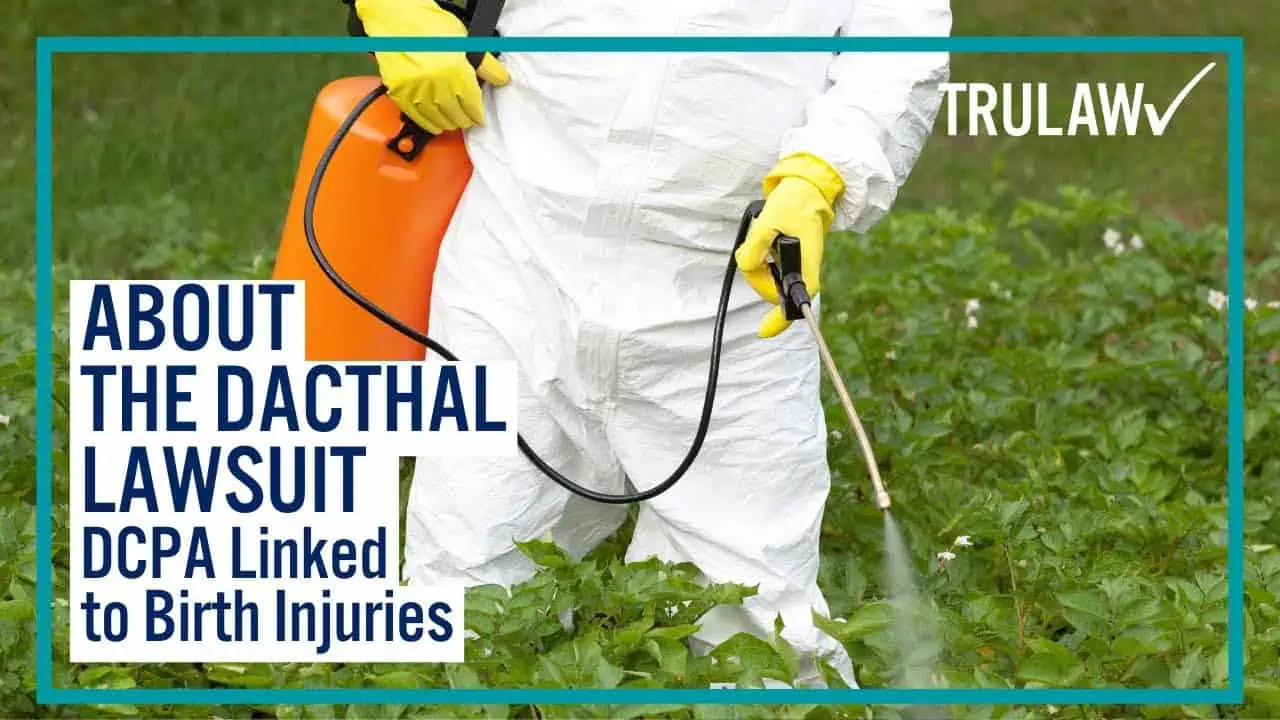
Significant Health Risks Linked to Dacthal Herbicide
The EPA took the rare step of issuing an emergency order in August 2024 to immediately suspend all uses and sales of Dacthal due to these severe risks, after AMVAC failed to provide necessary safety data for nearly 20 years despite repeated EPA requests.
Pregnant women exposed to DCPA are at risk of their unborn babies experiencing changes to fetal thyroid hormone levels, which are linked to serious health issues like:
- Decreased bone growth
- Disrupted brain development
- Lower birth weight
- Lower IQ
- Reduced motor skills
- Other serious developmental issues
These effects may be permanent and irreversible.
Allegations focus on AMVAC’s negligent conduct exposed pregnant women and their babies to unacceptable harm.
If you or a loved one has experienced severe health issues after being exposed to DCPA, you may qualify to pursue compensation.
Contact TruLaw using the chat on this page to receive an instant case evaluation and determine your eligibility to join others in filing a Dacthal Herbicide Lawsuit today.
Table of Contents

EPA Issues and Notices Reported for Dacthal (DPCA)
The Environmental Protection Agency (EPA) has recently taken significant regulatory action against the herbicide Dacthal, also known as DCPA, due to severe health and environmental concerns.
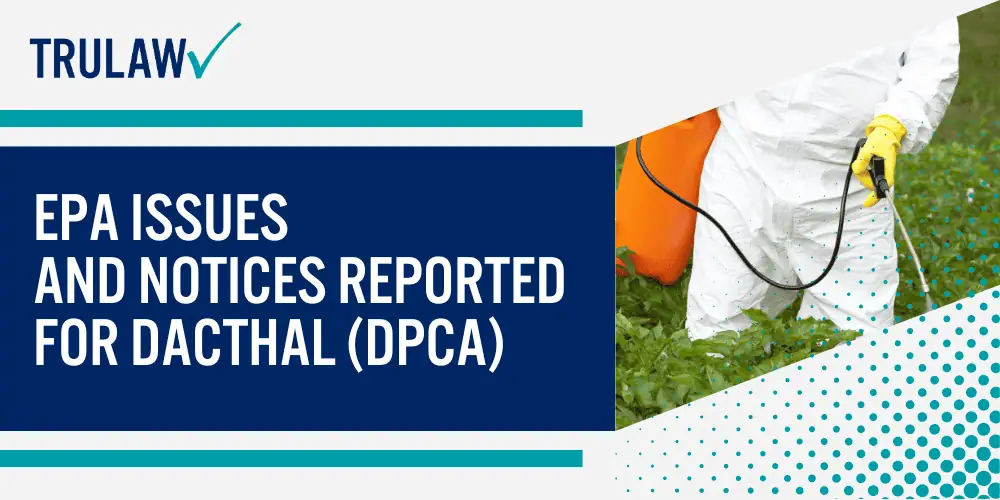
This has opened the door for potential lawsuits against the manufacturers and distributors of Dacthal products.
EPA Emergency Order to Stop DPCA Herbicide Use
In August 2024, the EPA issued an emergency order immediately suspending the registration of all pesticide products containing DCPA.
This action was taken due to evidence that DCPA exposure poses an “imminent hazard” to human health, particularly to fetuses of pregnant women exposed to the chemical. The order prohibits any further sale, distribution, or use of Dacthal products.
EPA Notice of Intent to Suspend the Herbicide DCPA
Prior to the emergency order in April 2022, the EPA filed a Notice of Intent to Suspend the registration of DCPA technical products.
This was due to the manufacturer’s failure to submit required toxicity studies on the effects of DCPA on thyroid development and fetal thyroid hormone levels.
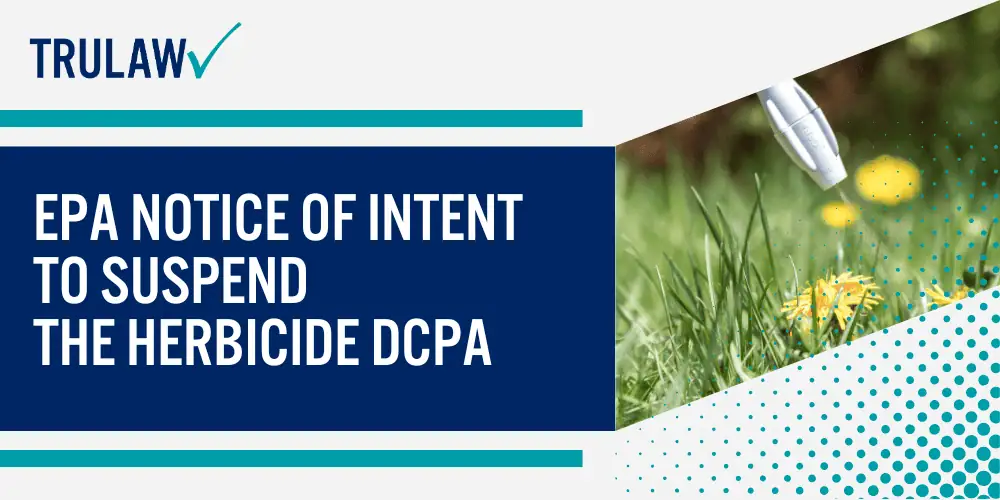
The Notice of Intent filed by the EPA outlines the following key points:
- The EPA required AMVAC to submit a comparative thyroid assay (CTA) study by May 2021
- AMVAC submitted only a dose range-finding report, which was insufficient to satisfy the data call-in (DCI) requirement
- The EPA determined that the complete CTA study was necessary to evaluate DCPA’s potential impact on thyroid hormone homeostasis and thyroid function in developing organisms.
- Failure to submit the required study led to the EPA’s decision to initiate suspension proceedings for the DCPA technical product registration
These points highlight AMVAC’s failure to comply with EPA regulations and demonstrate the company’s potential negligence in thoroughly investigating the safety of its product.
This information could be used in potential lawsuits to show that AMVAC was aware of the need for further safety studies but failed to conduct them in a timely manner, which may put public health at risk.
Dacthal (DPCA) Manufacturer Liability: AMVAC Chemical Corp
AMVAC Chemical Corporation is a prominent U.S. agrochemical company specializing in the development and distribution of agricultural chemicals, including herbicides, insecticides, and fungicides.
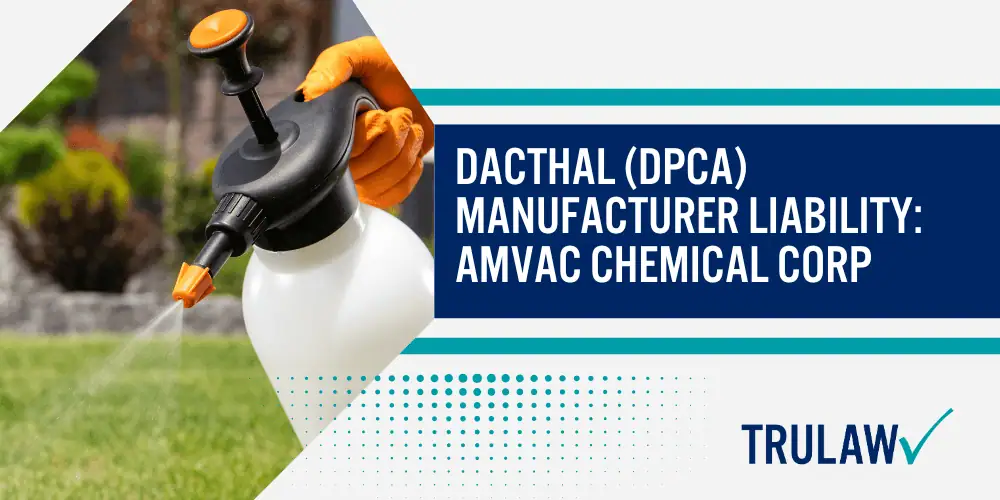
AMVAC Chemical Corporation stands as the sole registrant and manufacturer of DCPA products in the United States.
AMVAC Chemical Corporation Products Containing Dacthal
Among its products is Dacthal (DCPA), a pre-emergent herbicide commonly used on crops such as onions and broccoli.
However, Dacthal has been subject to scrutiny by the U.S. Environmental Protection Agency (EPA) due to concerns over potential health and environmental risks associated with its use.
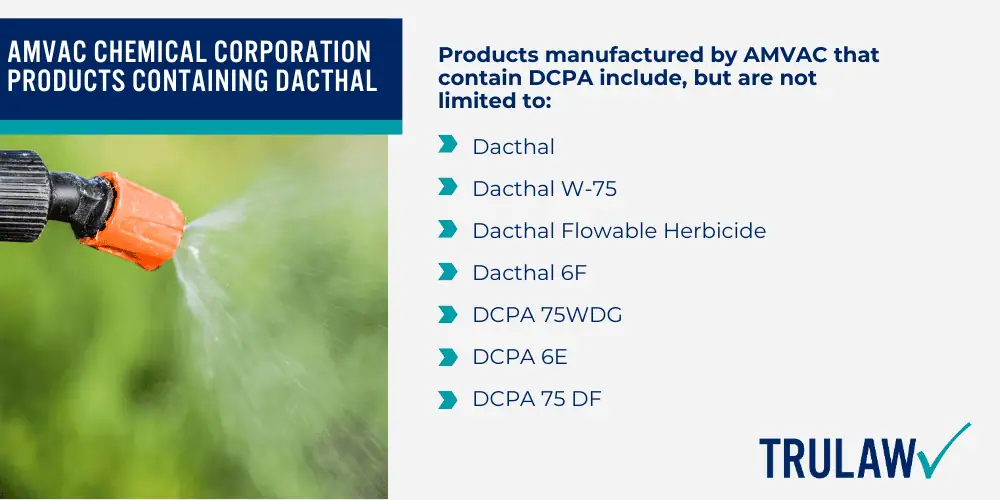
Products manufactured by AMVAC that contain DCPA include, but are not limited to:
- Dacthal
- Dacthal W-75
- Dacthal Flowable Herbicide
- Dacthal 6F
- DCPA 75WDG
- DCPA 6E
- DCPA 75 DF
Exposure to DCPA, particularly during pregnancy, may pose significant health risks of birth defects or other serious injuries, raising concerns about pesticide poisoning and its impact on unborn children and other vulnerable populations.
AMVAC’s Responsibility as the Exclusive Producer of DCPA
As the sole manufacturer of DCPA, AMVAC Chemical Corporation is responsible for safeguarding public health and the environment.
The company’s obligations extend beyond production to include a range of critical safety and regulatory duties to ensure the well-being of consumers and agricultural workers.
As the exclusive producer of DCPA, AMVAC bears primary responsibility for:
- Ensuring the safety of their DCPA products
- Conducting and submitting required safety studies to regulatory agencies
- Providing accurate information about the potential risks of DCPA use
- Implementing necessary precautions and warnings on product labels
Despite these responsibilities, AMVAC has faced significant scrutiny for failing to meet safety and regulatory standards related to DCPA.
The U.S. Environmental Protection Agency (EPA) recently issued an emergency suspension of DCPA due to AMVAC’s failure to submit essential safety data, particularly concerning the chemical’s impact on fetal thyroid hormone levels and overall thyroid development.
This delay in providing information persisted for nearly a decade while farmworkers and communities were exposed to Dacthal and its serious risks.
Furthermore, even after submitting the required studies, AMVAC’s precautions were found inadequate.
The chemical remained at unsafe levels in treated fields for weeks beyond the labeled re-entry period, presenting unacceptable risks to agricultural workers and nearby communities.
Potential Health Risks of Dacthal (DCPA) Exposure
Exposure to Dacthal (DCPA) has been linked to several serious health concerns, particularly among those who work in agriculture or live near treated fields.
The U.S. Environmental Protection Agency (EPA) has identified DCPA as a chemical with potential risks that warrant careful attention.
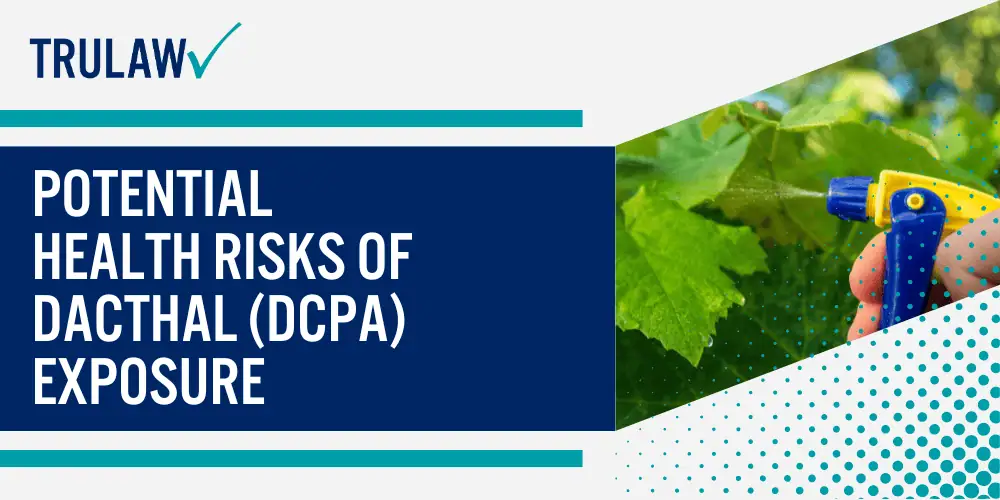
Pregnant women and young children are especially vulnerable, with studies suggesting that DCPA exposure may contribute to adverse developmental outcomes, including low birth weight, impaired motor skills, and cognitive delays.
Allegations in the Dacthal (DCPA) Herbicide Lawsuit
The ongoing Dacthal (DCPA) herbicide lawsuit alleges that AMVAC Chemical Corporation, the exclusive manufacturer of DCPA, failed to provide adequate warnings about the herbicide’s significant risks.
Plaintiffs claim that exposure to DCPA, particularly during pregnancy, has been associated with severe developmental issues such as birth defects and cognitive delays.
Additionally, it is alleged that AMVAC delayed submitting crucial safety data to regulatory bodies, thereby increasing the risk of prolonged exposure to dangerous levels of DCPA.
Allegations in the Dacthal (DCPA) herbicide lawsuit may include, but are not limited to:
- Inadequate warnings about the serious health risks linked to DCPA exposure
- Delays in submitting required safety studies to regulatory agencies
- Misleading information regarding the safety of DCPA on product labels
- Prolonged exposure risks due to insufficient safety measures
- Associations between DCPA exposure and birth defects, as well as developmental delays
These allegations suggest a pattern of negligence by AMVAC, raising concerns about the company’s commitment to public safety and compliance with regulatory requirements.
Seeking Medical Treatment for DCPA Herbicide Exposure
If you believe that you or a loved one has been exposed to DCPA, seeking medical advice is a prudent first step.
Early medical evaluation can help manage potential health impacts, particularly for pregnant women and young children who may be at higher risk.
Healthcare providers can conduct relevant tests to determine exposure levels and recommend appropriate actions based on your specific situation.
Steps to consider if you suspect DCPA herbicide exposure:
- Schedule a consultation with a healthcare provider to discuss possible symptoms and exposure risks
- Request testing to assess DCPA levels in your body, especially if you are pregnant or caring for young children
- Follow your healthcare provider’s recommendations for managing any symptoms related to exposure
- Maintain detailed records of all medical consultations and any symptoms you experience
- Consider seeking legal advice to explore your options for pursuing compensation
By taking these steps, you can address your health concerns and ensure that any potential impacts from DCPA exposure are thoroughly documented and appropriately managed.
If you or a loved one were exposed to DCPA and subsequently developed health issues or your child suffered developmental delays or other irreversible lifelong health problems, you may be eligible to pursue compensation.
Contact TruLaw using the chat on this page to receive an instant case evaluation and determine your eligibility to join others in filing a Dacthal herbicide lawsuit today.
Exposure Scenarios in the Dacthal Herbicide Lawsuit
Exposure to Dacthal (DCPA) has significantly impacted various populations, particularly those involved in agriculture and those living near treated areas.
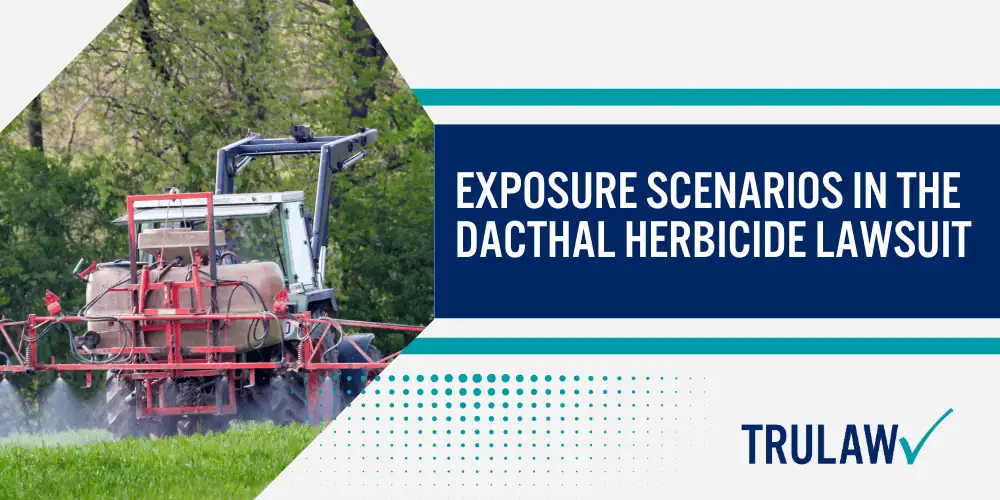
Identifying the scenarios in which DCPA exposure occurs is important for assessing the risks and determining who may be eligible to join the ongoing lawsuit.
Populations Affected by Dacthal Herbicide Exposure
Certain groups are more vulnerable to Dacthal exposure, primarily due to their proximity to or involvement in agricultural practices where the herbicide is used.
These populations include not only agricultural workers but also their families and nearby communities, who may be exposed through various means.
Populations that may be impacted by Dacthal herbicide exposure include, but are not limited to:
- Agricultural Workers: Individuals directly involved in the application of Dacthal or working in fields where the herbicide is used face a high risk of exposure. This group includes farmers, field workers, and pesticide applicators who may not always have access to adequate personal protective equipment.
- Residents Near Treated Fields: People living near agricultural fields where Dacthal is applied may experience exposure through drift, runoff, or contact with contaminated soil and water. They may inhale airborne particles or come into contact with residues.
- Pregnant Women: Pregnant women in or near treated areas are particularly vulnerable to DCPA’s potential effects on fetal development, leading to concerns about low birth weight and other pregnancy-related health issues.
- Children: Young children are at increased risk due to their developing bodies and behaviors that may lead to higher exposure, such as playing on contaminated ground or ingesting soil.
- Environmental Advocates and Concerned Citizens: Individuals or groups focused on environmental health are also engaged, monitoring and reporting on DCPA’s broader impacts on ecosystems and public health.
The groups affected by Dacthal herbicide exposure face varying degrees of risk depending on their level of contact with the chemical.
Agricultural workers directly involved in applying DCPA or handling treated crops are among those at the highest risk of exposure.
At the same time, pregnant women are of special concern due to the potential for DCPA to interfere with fetal development, leading to significant risks for both mother and child.
Environmental Impacts of Dacthal Herbicides
DCPA exposure raises significant concerns not only for human health but also for the environment.
The herbicide’s persistence in soil and water, combined with its potential to harm wildlife, presents long-term risks.
The lawsuit examines both the immediate and residual effects of DCPA use, as evidence suggests that its impact extends far beyond the intended targets.
The herbicide’s persistence in the environment means that it can remain active in soil and water long after its application, potentially contaminating local ecosystems.
This persistence leads to a buildup of DCPA residues in the soil, which can degrade its quality and reduce the fertility of agricultural land, making it less productive over time.
Water contamination is another serious risk. DCPA can leach into groundwater or be carried into streams and rivers through runoff, posing risks to aquatic life and potentially entering drinking water supplies.
Wildlife, particularly species that rely on the affected ecosystems, may be exposed to DCPA through contaminated water or food sources, leading to health problems such as reproductive issues and increased mortality rates.
Dacthal (DCPA) Herbicide Research and Scientific Studies
Scientific studies mandated by the Environmental Protection Agency (EPA) have revealed significant health risks and health and environmental risks associated with Dacthal (DCPA).

Despite precise requirements, the failure to submit these studies on time has led to severe consequences, including the suspension of DCPA products.
Dacthal (DCPA) Research Required by the EPA
The EPA required AMVAC Chemical Corporation to submit over 20 studies to evaluate the safety of Dacthal.
These studies were intended to assess DCPA’s impact on thyroid function, particularly its effects on fetal development.
This research is vital for determining whether the herbicide meets safety standards for continued use.
Specific research requirements included:
- Comparative Thyroid Assay (CTA) Study: This study focuses on DCPA’s effects on thyroid hormone regulation, especially in developing fetuses. The thyroid gland plays a vital role in brain development, and disruptions can lead to impaired brain development and impaired motor skills.
- Long-Term Toxicity Studies: These studies were intended to examine the potential long-term health effects of DCPA exposure, including risks of cancer and reproductive harm.
- Environmental Impact Assessments: These assessments were necessary to evaluate the herbicide’s persistence in soil and water and its potential to harm non-target wildlife.
This extensive research is fundamental to ensuring the safety and effectiveness of DCPA in agricultural and non-agricultural settings.
By requiring these studies, the EPA aims to protect public health and the environment from potential hazards posed by this chemical.
Failure to Submit Dacthal Herbicide Studies to the EPA
AMVAC failed to submit many of these critical studies within the required time frame, delaying the EPA’s ability to assess DCPA’s safety.
This failure led to the EPA issuing a Notice of Intent to Suspend (NOITS) DCPA’s registration in April 2022, nearly ten years after the initial request for data.
Key issues with AMVAC’s submissions included:
- Missed Deadlines: AMVAC’s failure to provide the required studies by the January 2016 deadline significantly delayed the regulatory process. The data was deemed overdue by six years before the EPA took action.
- Incomplete Data: Some of the studies AMVAC submitted were incomplete or insufficient, hindering the EPA’s ability to assess the risks of DCPA fully. Preliminary data suggested that DCPA could affect fetal thyroid function at lower doses than previously understood, yet a complete study was not provided.
- Prolonged Public Exposure: The delay in providing the necessary research meant that DCPA continued to be used in agriculture, potentially exposing farmworkers, pregnant women, and nearby residents to harmful levels of the chemical.
The failure to comply with these research requirements not only jeopardizes public safety but also underscores the importance of regulatory oversight in the continued use of chemicals like DCPA.
The ongoing Dacthal lawsuit is deeply intertwined with these research failures, as they highlight significant risks and serious health risks in ensuring the safety of this widely used herbicide.
Historical Use of Dacthal (DCPA) Herbicide
Dacthal (DCPA) has been used for decades in agricultural settings to manage weeds in various crops.
Its widespread application across the United States has raised concerns about the long-term effects on both human health and the environment.
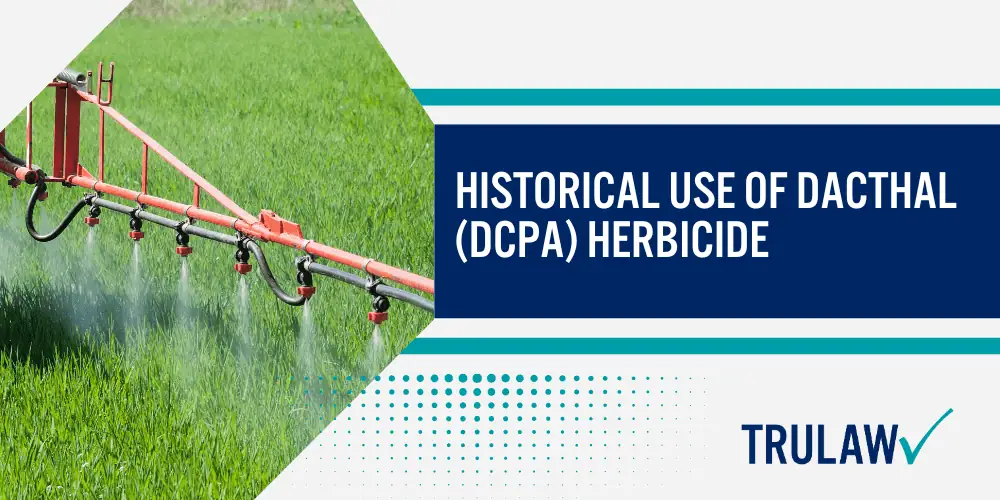
DCPA herbicides have also been applied in non-agricultural use cases such as golf courses and ornamental turf.
Common Agricultural Uses of Dacthal (DCPA) Herbicide
Dacthal has been predominantly used in the cultivation of vegetables and certain specialty crops.
Its role as a pre-emergent herbicide makes it valuable in controlling weed growth before crops begin to sprout, thereby protecting the yield and quality of the produce.
Key crops treated with Dacthal include:
- Onions and Garlic: Dacthal is commonly used in onion and garlic fields to prevent the growth of grass and broadleaf weeds, which can compete with the crops for nutrients and water.
- Cole Crops (e.g., Broccoli, Cabbage, Brussels Sprouts): The herbicide is frequently applied to these crops to control weed populations that can hinder the growth of the plants.
- Cucurbits (e.g., Melons, Cucumbers, Squash): Dacthal has been used to manage weeds in fields growing these types of crops, ensuring a more robust harvest.
- Tomatoes: The herbicide is also applied in tomato cultivation to manage the weeds that compete with young tomato plants.
Dacthal usage across these crops highlights its importance in agricultural production; however, it also underscores the potential serious risks of exposure, especially in areas where these crops are extensively grown.
Areas of DCPA Exposure Concerns in the United States
Concerns over DCPA exposure are not limited to agricultural workers applying herbicides but extend to nearby communities and the environment.
Various regions in the U.S. where these crops are heavily cultivated have been identified as areas of heightened concern.
Regions with notable DCPA exposure concerns include:
- California’s Central Valley: As one of the most productive agricultural regions in the world, the Central Valley sees extensive use of herbicides like Dacthal.The close proximity of farming communities to treated fields raises concerns about both direct and indirect exposure.
- Southeastern U.S. (e.g., Georgia, Florida): In these states, where crops like onions and cucurbits are widely grown, the application of Dacthal has been a common practice, leading to concerns about groundwater contamination and air quality.
- Pacific Northwest (e.g., Oregon, Washington): These states are known for their production of onions and other vegetables, and the use of Dacthal in these areas has raised alarms about potential environmental and health impacts.
- Great Plains (e.g., Nebraska, Kansas): Dacthal is used in various vegetable crops grown in these states, contributing to concerns about its persistence in soil and the potential for runoff into water sources.
The widespread use of Dacthal in these regions has led to growing awareness and scrutiny of the herbicide’s long-term effects, especially as evidence mounts linking it to significant health risks and health issues.
How to File a Dacthal Herbicide Lawsuit Claim
If you or a loved one has been exposed to Dacthal (DCPA) and suffered health complications, you may be eligible to file a lawsuit against the manufacturers.
The process of filing a Dacthal lawsuit involves determining your eligibility, gathering the necessary evidence, and finding legal representation that specializes in toxic exposure cases.

If you or a loved one were exposed to DCPA and subsequently developed health issues or your child suffered developmental delays or other irreversible lifelong health problems, you may be eligible to pursue compensation.
Contact TruLaw using the chat on this page to receive an instant case evaluation and determine your eligibility to join others in filing a Dacthal herbicide lawsuit today.
Eligibility Criteria to File a Dacthal (DCPA) Herbicide Lawsuit
Before filing a lawsuit, it’s important to determine whether you meet the eligibility criteria.
Several factors can influence your eligibility, including the nature of your exposure, the health effects you’ve experienced, and the timeline of your symptoms.
Key eligibility criteria include, but are not limited to:
- Direct Exposure to DCPA: Individuals who have directly handled or applied Dacthal, such as agricultural workers, are often at the highest risk of exposure. This includes those who worked in fields treated with herbicides or handled produce from those fields.
- Residential Proximity to Treated Areas: Residents living near agricultural fields where Dacthal was applied may have been exposed through drift, contaminated water, or soil. If this secondary exposure leads to health issues, it can also be the basis of a lawsuit.
- Health Conditions Linked to DCPA Exposure: The development of specific health issues known to be associated with DCPA exposure, such as birth defects, thyroid issues, or developmental delays, can be a critical factor in establishing a claim. Medical records documenting these conditions will be essential.
- Timing of Exposure and Diagnosis: Another important factor is the timing of your exposure relative to the onset of symptoms. Establishing a clear link between your exposure to DCPA and your health issues can strengthen your case.
- State of Residence: Laws regarding toxic exposure and product liability can vary by state. Some states have statutes of limitations that could affect your ability to file a lawsuit, so it’s important to act quickly if you believe you have a claim.
Determining your eligibility is the first step toward seeking justice and compensation for the harm caused by DCPA exposure. If you meet these criteria, you may have the right to pursue legal action against the responsible parties.
TruLaw: Filing a Dacthal Herbicide Lawsuit
Securing experienced legal representation is important while pursuing a toxic exposure lawsuit.
TruLaw and partner law firms have successfully collected over $3 Billion through verdicts and settlements on behalf of injured individuals in all 50 states.
TruLaw can help you gather evidence to support your claim and determine your eligibility to pursue compensation.
By leveraging their extensive legal network, they can provide you with the best possible outcome in your case.
If you or a loved one were exposed to DCPA and subsequently developed health issues or your child suffered developmental delays or other irreversible lifelong health problems, you may be eligible to pursue compensation.
Contact TruLaw using the chat on this page to receive an instant case evaluation and determine your eligibility to join others in filing a Dacthal herbicide lawsuit today.
Frequently Asked Questions
-
What are Dacthal Herbicides (DPCA)?
Dacthal Herbicides, also known as DPCAs (Dimethyl Tetrachloroterephthalate), are commonly used to control various crops, turf, lawns, and gardens to prevent weed growth.
-
What are the health risks associated with exposure to Dacthal (DCPA) herbicides?
Exposure to Dacthal (DCPA) herbicides has been linked to severe health risks, particularly for pregnant women and fetuses.
These risks include impaired brain development, low birth weight, reduced motor skills, and other serious developmental issues.
-
Who is most affected by Dacthal (DCPA) exposure?
Agricultural workers who directly handle the herbicide, residents living near treated fields, pregnant women, and children are among the populations most affected by Dacthal exposure.
These groups face varying degrees of risk depending on their level of contact with the chemical.
-
What action has the EPA taken regarding Dacthal (DCPA) herbicides?
In August 2024, the EPA released an emergency suspension of all DCPA products, citing concerns about their impact on fetal development when pregnant women are exposed.
This was the first such suspension in nearly 40 years.
-
Who is the sole manufacturer of Dacthal (DCPA) herbicides in the United States?
AMVAC Chemical Corporation stands as the sole registrant and manufacturer of DCPA products in the United States.
As the exclusive producer, AMVAC bears primary responsibility for ensuring the safety of their DCPA products and providing accurate information about potential risks.
-
What are the allegations in the Dacthal (DCPA) herbicide lawsuit?
The ongoing Dacthal (DCPA) herbicide lawsuit alleges that AMVAC Chemical Corporation failed to provide adequate warnings about the herbicide’s significant risks and delayed submitting crucial safety data to regulatory bodies.
Plaintiffs claim that exposure to DCPA, particularly during pregnancy, has been associated with severe developmental issues.
-
How can I determine if I am eligible to file a Dacthal (DCPA) herbicide lawsuit?
To determine your eligibility to file a Dacthal (DCPA) herbicide lawsuit, consider factors such as direct exposure to DCPA, residential proximity to treated areas, health conditions linked to DCPA exposure, and the timing of exposure and diagnosis.
Contact TruLaw using the chat on this page to receive an instant case evaluation and determine your eligibility to join others in filing a Dacthal herbicide lawsuit today.

Managing Attorney & Owner
With over 25 years of legal experience, Jessica Paluch-Hoerman is an Illinois lawyer, a CPA, and a mother of three. She spent the first decade of her career working as an international tax attorney at Deloitte.
In 2009, Jessie co-founded her own law firm with her husband – which has scaled to over 30 employees since its conception.
In 2016, Jessie founded TruLaw, which allows her to collaborate with attorneys and legal experts across the United States on a daily basis. This hypervaluable network of experts is what enables her to share the most reliable, accurate, and up-to-date legal information with our readers!
Here, at TruLaw, we’re committed to helping victims get the justice they deserve.
Alongside our partner law firms, we have successfully collected over $3 Billion in verdicts and settlements on behalf of injured individuals.
Would you like our help?
At TruLaw, we fiercely combat corporations that endanger individuals’ well-being. If you’ve suffered injuries and believe these well-funded entities should be held accountable, we’re here for you.
With TruLaw, you gain access to successful and seasoned lawyers who maximize your chances of success. Our lawyers invest in you—they do not receive a dime until your lawsuit reaches a successful resolution!
AFFF Lawsuit claims are being filed against manufacturers of aqueous film-forming foam (AFFF), commonly used in firefighting.
Claims allege that companies such as 3M, DuPont, and Tyco Fire Products failed to adequately warn users about the potential dangers of AFFF exposure — including increased risks of various cancers and diseases.
Depo Provera Lawsuit claims are being filed by individuals who allege they developed meningioma (a type of brain tumor) after receiving Depo-Provera birth control injections.
A 2024 study found that women using Depo-Provera for at least 1 year are five times more likely to develop meningioma brain tumors compared to those not using the drug.
Suboxone Tooth Decay Lawsuit claims are being filed against Indivior, the manufacturer of Suboxone, a medication used to treat opioid addiction.
Claims allege that Indivior failed to adequately warn users about the potential dangers of severe tooth decay and dental injuries associated with Suboxone’s sublingual film version.
Social Media Harm Lawsuits are being filed against social media companies for allegedly causing mental health issues in children and teens.
Claims allege that companies like Meta, Google, ByteDance, and Snap designed addictive platforms that led to anxiety, depression, and other mental health issues without adequately warning users or parents.
Transvaginal Mesh Lawsuits are being filed against manufacturers of transvaginal mesh products used to treat pelvic organ prolapse (POP) and stress urinary incontinence (SUI).
Claims allege that companies like Ethicon, C.R. Bard, and Boston Scientific failed to adequately warn about potential dangers — including erosion, pain, and infection.
Bair Hugger Warming Blanket Lawsuits involve claims against 3M — alleging their surgical warming blankets caused severe infections and complications (particularly in hip and knee replacement surgeries).
Plaintiffs claim 3M failed to warn about potential risks — despite knowing about increased risk of deep joint infections since 2011.
Baby Formula NEC Lawsuit claims are being filed against manufacturers of cow’s milk-based baby formula products.
Claims allege that companies like Abbott Laboratories (Similac) and Mead Johnson & Company (Enfamil) failed to warn about the increased risk of necrotizing enterocolitis (NEC) in premature infants.
Here, at TruLaw, we’re committed to helping victims get the justice they deserve.
Alongside our partner law firms, we have successfully collected over $3 Billion in verdicts and settlements on behalf of injured individuals.
Would you like our help?












